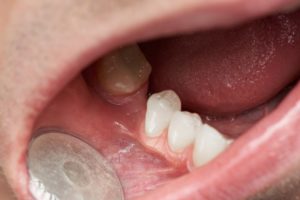
As an adult, losing a tooth isn’t nearly as exciting as it was as a child. With no new tooth coming in to replace it naturally, it’s up to you whether or not to fill that gap in your smile. It may be tempting not to, especially if you’ve lost a tooth in the back of your mouth that you don’t think anyone will see. However, the rest of your mouth will notice! As soon as a tooth is knocked out or extracted, your jaw and remaining teeth begin to change, which can lead to health issues like gum disease, digestive issues, and bone loss. Your dentist in Marlton explains the consequences and complications of a missing tooth and which replacement options can protect your smile.
How Your Mouth Reacts to a Gap in Your Smile
Losing a tooth can immediately have an impact on your ability to eat easily and speak clearly, but those aren’t the only symptoms you’ll experience! You could also notice changes in your:
- Teeth: Sometimes, the teeth on either side of a missing tooth will grow into the open space. These overgrown teeth can become misshapen and difficult to keep clean.
- Bite: The neighboring teeth may also shift towards each other in order to partially fill the gap, which can lead to a crooked bite. This condition is called malocclusion, and it can impact the efficiency and strength of your bite.
- Jaw and face: Teeth support the jawbone by stimulating blood flow. Without that stimulation, the bone tissue begins to deteriorate, which can cause you to look older.
- Oral health: These changes in your mouth make it more difficult to remove plaque and bacteria, which will increase your risk of oral health conditions like tooth decay, gum disease, and oral infections.
Dental Implants Are a Permanent, Lifelike Restoration
No matter how many teeth you’re missing, dental implants can help you restore the look, health, and function of your smile. Titanium posts are integrated directly into the jawbone to encourage bone growth and provide lifelike stability for the new teeth. Above the gumline, they also support the neighboring teeth and allow you to talk, eat, and smile with ease and confidence. One or two missing teeth may be replaced by an implant-supported crown or bridge, while implant-supported partial or full dentures can replace many more at one time. With regular brushing and flossing, these restorations can protect your smile for a lifetime.
Thanks to dental implants, there’s no need to deal with the complications of one or more missing teeth. Talk to your dentist to discover the treatment plan that can best help you restore your healthy, happy, and functioning smile!
About the Author
Dr. Jennifer Kazemi is committed to helping her patients meet their personal wellness goals and achieve the beautiful, healthy smile they’ve always wanted. She has completed numerous continuing education courses since obtaining her DMD. Several of these courses took her around the globe to learn more about the newest practices in dental implant dentistry. She would be happy to help you decide which tooth replacement option is right for you, so feel free to contact her at her website or (856) 983-4846.
